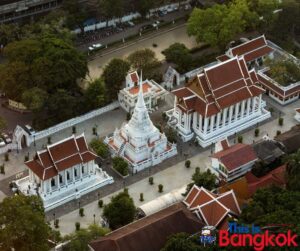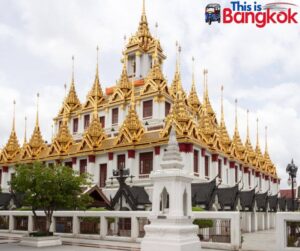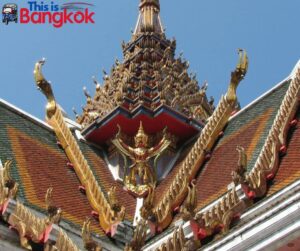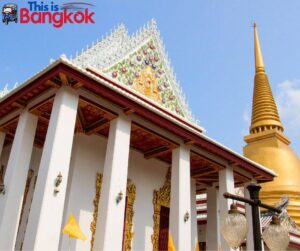Wat Pho (Temple of the Reclining Buddha)
Wat Phra Chetuphon Wimon Mangkhalaram Rajwaramahawihan, also known as Wat Pho or Temple of the Reclining Buddha, is one of Bangkok, Thailand’s most revered and significant temples.
It is famous for its stunning architecture, historical importance, and role as a traditional Thai medicine and massage center.
Here are some critical details about Wat Phra Chetuphon:
Location
Wat Phra Chetuphon is in the historic center of Bangkok, right next to the Grand Palace and the Temple of the Emerald Buddha (Wat Phra Kaew).
It is located on the banks of the Chao Phraya River, making it easily accessible to tourists and locals alike.
History
The temple was initially founded in the 16th century during the Ayutthaya period and later expanded and renovated during the reign of King Rama I in the 18th century.
King Rama I also ordered the construction of the famous Reclining Buddha image, which is one of the main attractions at the temple.
Reclining Buddha
Wat Pho is renowned for its enormous Reclining Buddha statue, known locally as “Phra Buddhasaiyas.” The statue is 46 meters long and 15 meters high, representing the Buddha’s entry into Nirvana.
The statue is covered in gold leaf and features intricate mother-of-pearl inlay on its feet.
Thai Massage
Wat Pho is considered the birthplace of traditional Thai massage.
The temple’s traditional medicine and massage school, established on the temple grounds, offers courses to both Thais and foreigners.
Wat Pho Thai Traditional Massage School is known for teaching the ancient art of Thai massage and has contributed significantly to its global popularity.
Architecture
The temple complex is a prime example of classical Thai architecture.
Its buildings are adorned with colorful tiles, intricate stucco work, and traditional Thai motifs. The architecture and design of Wat Pho showcase the rich cultural and artistic heritage of Thailand.
Courtyards and Cloisters
Wat Pho features a vast complex with numerous courtyards, gardens, and cloisters.
These areas are tranquil and ideal for contemplation and relaxation.
Visitors can explore the temple’s many halls and chapels, each housing Buddha images and other religious artifacts.
Thai Traditional Medicine
In addition to massage, Wat Pho is also a center for traditional Thai medicine.
The temple houses a collection of inscribed stones with information about traditional Thai herbs and treatments.
This knowledge has been passed down through generations and is still used today.
UNESCO World Heritage Site
Wat Pho, along with the nearby Grand Palace and Wat Phra Kaew, is part of the historic Rattanakosin Island in Bangkok, designated as a UNESCO World Heritage Site.
This recognition highlights the cultural and historical significance of these landmarks.
Visiting Wat Pho allows one to appreciate Thai culture’s architectural and artistic beauty and learn about traditional Thai medicine and massage practices.
It remains a must-visit destination for tourists exploring Bangkok’s rich cultural heritage.
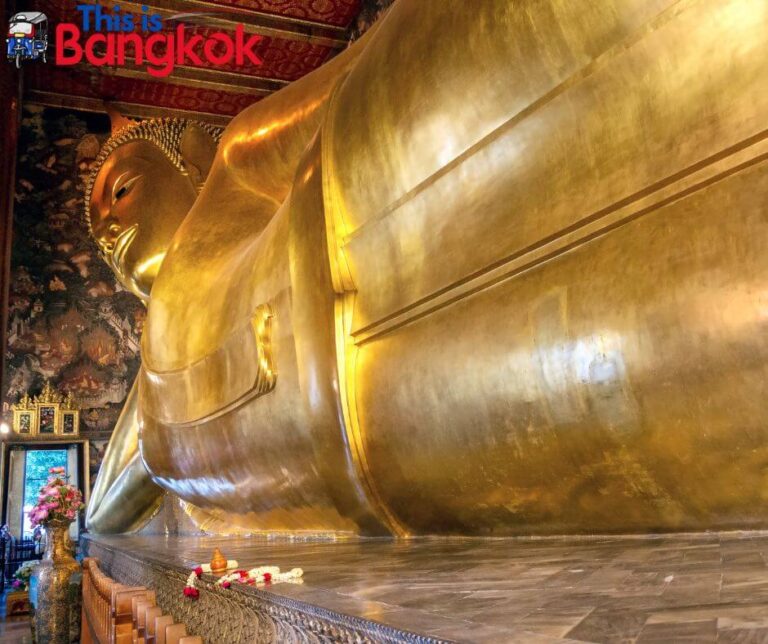
| Attribute | Details |
|---|---|
| Name | Wat Phra Chetuphon (Wat Pho) |
| Location | Bangkok, Thailand |
| Founded | 16th century (expanded in the 18th century) |
| Main Attraction | Reclining Buddha statue (Phra Buddhasaiyas) |
| Architecture Style | Classical Thai architecture |
| UNESCO World Heritage Site | Yes |
| Dress Code | Modest attire covering shoulders and knees |
| Entrance Fee | Foreigners: 300 Baht, Thais: Free |
| Traditional Thai Massage | Yes, traditional Thai massage courses are available |
| Nearby Attractions | Grand Palace, Wat Phra Kaew (Temple of the Emerald Buddha) |
| Recommended Visit Duration | 1-2 hours (more for in-depth exploration) |
| Notable Features | Intricate stucco work, mother-of-pearl inlay on Buddha’s feet, traditional Thai medicine, tranquil courtyards |
| Importance | Cultural, historical, and religious significance |
| Accessibility | Easily accessible by public transport and boat along the Chao Phraya River |
What is the dress code for Wat Phra Chetuphon?
Visitors must dress modestly at Wat Phra Kaew, covering shoulders, knees, and avoiding revealing clothing.
How much is the entrance fee for Wat Phra Chetuphon?
The admission fee is 300 Baht per person.
Is Wat Pho worth a visit?
Yes, Wat Pho is worth a visit for its stunning Reclining Buddha, traditional Thai massage, and rich cultural heritage.
Can I wear sandals to Wat Pho?
Wearing sandals at Wat Pho is acceptable, but you may be required to remove them when entering certain buildings or temple areas.
How long does it take to see Wat Pho?
A visit to Wat Pho can take 1 to 2 hours to explore the main highlights, but you can spend more time exploring in depth or getting a traditional Thai massage.
Address:
- 2 Sanam Chai Rd, Phra Borom Maha Ratchawang, Phra Nakhon, Bangkok 10200
Contact:
Opening Hours:
- Daily: 8:00–18:30
Entrance Fee:
- 300 THB
- Buy tickets here

